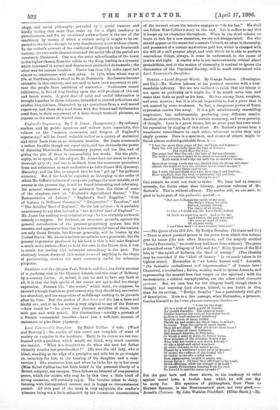England's Supremacy. By J. S. Jeans. (Longmans.)—By ordinary readers, and
by public speakers and writers more especially, this volume on the "sources, economics, and dangers of England's supremacy," will be found valuable rather as a quarry of statistical and other facts than as an elaborate treatise. Mr. Jeans commands a rather forcible though not equal style, and has obviously the power of digesting Blue-books, Parliamentary papers, and the like, and of giving the gist of them in commendably few words. But the philo- sophy, so to speak, of his subject, Mr. Jeans does not seem to have a thorough grip of ; and mm is inclined, from the numerous quotations from and references to such authorities as John Stuart Mill, Qaesnay, Macaulay, and the like, to suspect that he has "got up" his political economy. But if the book be regarded as belonging to the order of which Mr. Giffen's volumes of essays are perhaps the most notable, at all events in the present day, it will be found interesting and informing. Its general character may be gathered from the titles of some of the chapters, such as "England's Agricultural Status," "The Remuneration of Labour," "England's Food Supplies," "Cost of Labour in Different Countries," " Emigration," " Taxation," and " The Achilles' Heel of England." On the last subject—it is probably unnecessary to say that Ireland is " the Achilles' heel of England"— Mr. Jeans has nothing very original to say ; be has certainly no heroic remedy to suggest. He declares, on economic grounds, against the general introduction of the peasant-proprietary system into this country, and appears to fear that in the commercial race of the nations, not only Great Britain, but Europe generally, will be beaten by the United States. Mr. Jeans is neither an optimist nor a pessimist ; but the general impression produced by his book is that it will take England a much more serious effort to hold her own in the future than it cost to attain her trading and industrial ascendency in the past. The obviously honest desire of this writer to avoid anything in the shape of partisanship, renders his work eminently useful for reference purposes.


































 Previous page
Previous page